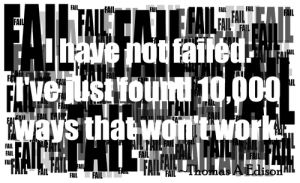Trademark Owners Just Can’t Win Keyword Advertising Cases–EarthCam v. OxBlue
I have repeatedly observed that trademark owners routinely lose their lawsuits against advertisers who buy their trademarks as advertising keywords. (This is in addition to the futility of bringing trademark lawsuits against search engines, which almost no one does any more). I can’t recall the last time that I saw a trademark owner win a keyword advertising lawsuit; since the Network Automation case, those wins have been scarce.
Today’s case involves two companies in the security camera business. EarthCam initiated a wide-ranging trade secret, CFAA and copyright lawsuit against OxBlue. OxBlue scorch-earthed its response to EarthCam with a panoply of counterclaims. As an outside observer, it’s always fun to see competitors locked in a death match in court. As one of the litigants, not so much.
Let’s focus on OxBlue’s trademark counterclaim. For a few months in 2010, an EarthCam subsidiary, Work Zone Cam, purchased “oxblue” as part of its keyword advertising campaign. OxBlue’s trademark infringement claim goes nowhere:
OxBlue has not addressed any of these factors, let alone presented any evidence of a likelihood of confusion based on these factors. There is no evidence of the labeling and appearance of Work Zone Cam’s advertisements and the surrounding context of the screen displaying the search results. Nor is there any evidence in the record on how often customers were lured to the Work Zone Cam’s website when they searched for OxBlue on the Internet. See 1–800 Contacts, 722 F.3d at 1244 (holding that there was no likelihood of “initial interest confusion” because an expert report showed that customers clicked on the defendant’s advertisement only 1.5% of the time that an advertisement was generated by an infringing keyword search term). No evidence has been presented that would allow the Court to properly evaluate OxBlue’s trademark infringement claim. OxBlue’s trademark infringement claim based on “initial interest confusion” is required to be dismissed because OxBlue failed to address or present evidence on any of the factors relevant to whether there is a likelihood of confusion.
The associated false designation of origin claim fails along with it.

Photo credit: failure will lead to success // ShutterStock
* the court granted both defendants’ summary judgment motions, so it’s possible the judge got tired of the competitive sniping in court and the trademark claim got caught in the downdraft.
* the judge was obviously unimpressed with OxBlue’s advocacy of the trademark claim. Would more spirited advocacy have done better?
* the court doesn’t dwell on it, but the court does note OxBlue’s lack of clean hands, an all-too-common situation in keyword ad cases. In 2003, OxBlue had purchased “EarthCam” as part of its keyword advertising campaign.
* trademark owners routinely struggle to find any credible evidence of consumer confusion from keyword advertising. Here, the court generously gave OxBlue the benefit of assuming the initial interest confusion doctrine was viable. OxBlue still couldn’t clear that seemingly low bar. Then again, as I’ve indicated before, the initial interest confusion doctrine is effectively dead. It’s been years since the doctrine actually helped a plaintiff win a case; and to the extent other courts follow the 1-800 Contacts v. Lens.com ruling, we may never see another successful initial interest confusion-keyword advertising case again.
I’m going to give OxBlue the benefit of the doubt and assume it would not have initiated this trademark claim, but instead pursued the trademark counterclaim only as part of a “f’em” response to EarthCam’s initiation of combat. Even so, it was a waste of money.
Case citation: EarthCam, Inc. v. OxBlue Corp., 2014 WL 4702200 (N.D. Georgia Sept. 22, 2014).
Some of my Tertium Quid blog posts on keyword advertising legal issues:
* Florida Allows Competitive Keyword Advertising By Lawyers
* More Evidence That Competitive Keyword Advertising Benefits Trademark Owners
* Suing Over Keyword Advertising Is A Bad Business Decision For Trademark Owners
* Florida Proposes to Ban Competitive Keyword Advertising by Lawyers
* More Confirmation That Google Has Won the AdWords Trademark Battles Worldwide
* Google’s Search Suggestions Don’t Violate Wisconsin Publicity Rights Law
* Amazon’s Merchandising of Its Search Results Doesn’t Violate Trademark Law
* Buying Keyword Ads on People’s Names Doesn’t Violate Their Publicity Rights
* With Its Australian Court Victory, Google Moves Closer to Legitimizing Keyword Advertising Globally
* Yet Another Ruling That Competitive Keyword Ad Lawsuits Are Stupid–Louisiana Pacific v. James Hardie
* Another Google AdWords Advertiser Defeats Trademark Infringement Lawsuit
* With Rosetta Stone Settlement, Google Gets Closer to Legitimizing Billions of AdWords Revenue